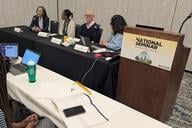You have /5 articles left.
Sign up for a free account or log in.
The movement to boycott Indiana is growing. Not only are some higher education groups being urged to relocate meetings scheduled to take place there, but one university and a state are barring the use of certain funds for employees to travel there.
Further, more college leaders in the state are speaking out against a new Indiana law that supporters say protects religious freedom, but that many critics say encourages bias against gay people. The law bars government actions that "burden" people or businesses for actions taken based on religious beliefs. The legislation -- similar to bills proposed or enacted elsewhere in the country -- was a response to the move to permit same-sex marriage. While Indiana is not unique in having such a law, it attracts many conventions (from academic and other groups) and is host for many intercollegiate athletic events.
While many academic groups have criticized the Indiana law, not all are backing the movement to limit travel funds for use in the state. The American Association of University Professors says such rules limit academic freedom, and that professors should not be limited in the use of travel funds based on a political decision by a given state.
Leslie E. Wong, president of San Francisco State University, announced Monday that no university funds -- regardless of where they originated -- may be used for travel to Indiana by either students or employees. He said that travel authorized prior to Monday may proceed, but no new authorizations will be permitted.
Wong is applying the travel ban to himself, even for a trip he planned previously. He is a member of the National Collegiate Athletic Association's Division II Presidents Council and will skip a meeting in April scheduled for Indianapolis.
"I am dismayed, if not extremely disappointed, in the recent legislation signed into law in Indiana," Wong said in a statement. "It is unconscionable for this great university to spend its resources in a state that attempts to legislate discrimination of any kind."
In Connecticut, Governor Dannel P. Malloy, a Democrat, issued an executive order barring the use of state funds by state employees (including those in higher education) from traveling to states with laws such as the new Indiana statute. The law has an exemption for contractual obligations, so it may have more impact going forward than for trips currently approved. A spokeswoman for the University of Connecticut said that officials there were working to figure out how to carry out the order.
In Washington State, Governor Jay Inslee, a Democrat, announced plans for a similar policy, but his statement did not specify whether public higher education would be covered. A spokeswoman said details would be forthcoming.new graph here -sj
Organizers of academic meetings already scheduled for Indianapolis are struggling to respond, with most noting that their meeting locations were set years before the new Indiana measure was proposed.
Ron Zwerin, director of marketing and communications for Educause, said that officials were looking for ways to reassure those planning to attend its annual meeting, set for October in Indianapolis. He said Educause was working with local Indiana tourism officials to be sure that the 8,000-some people who typically attend its conference know that there are nondiscriminatory businesses available to serve them. Further, he noted that Educause runs a virtual conference so those who opt to stay away can experience the meeting.
He said that "our options are extremely limited," given the difficulty of moving a meeting of that size.
NASPA: Student Affairs Administrators in Higher Education is scheduled to hold its 2016 annual meeting in Indianapolis, and is facing a strong push by some members to move the meeting. On Monday, Kevin Kruger, president of the association, released a letter in which he thanked members for their input, condemned the Indiana law and said that the association was engaged in a "full exploration of all options." Several members posted comments saying that they would not attend a NASPA meeting in Indianapolis.new graph here
Academic Freedom Issues?
Hank Reichman, chair of the American Association of University Professors' Committee A on Academic Freedom and Tenure and a professor emeritus of history at California State University at East Bay, said he was sympathetic to those who want to take a stand against the Indiana law. But he said that limits on travel by professors -- even if motivated by the desire to oppose discrimination -- are wrong.
"Let's say there are people in Indiana who invite an academic to give a speech," he said. Their academic freedom is denied if a professor can't travel there to deliver the talk. Likewise, a professor who wants to attend a conference in Indiana or conduct research at a library there should be as eligible for travel funds to go there as to any other place.
"This affects professors doing scholarly work, and so that's a problem," he said.
While the bans are only on the use of university funds (for San Francisco State) or state funds (for Connecticut public colleges), Reichman said it was wrong to suggest that those professors who want to travel to Indiana simply pay for the travel themselves.
"Once a university agrees to fund faculty travel, criteria need to be neutral," he said.




